- Home
- Jr. Horatio Alger
Robert Coverdale's Struggle; Or, on the Wave of Success Page 3
Robert Coverdale's Struggle; Or, on the Wave of Success Read online
Page 3
CHAPTER III
THE WIND BROUGHT GOOD LUCK
John Trafton was sitting out on the porch of the tavern when his nephewcame out of the side gate.
"There's your nephew, Trafton," said old Ben Brandon, who, like JohnTrafton, frequented the barroom too much for his good. "Hasn't come herefor his dram, has he?" added the old man, chuckling.
John Trafton's curiosity was excited, for he had no idea of any errandthat could bring Robert to the tavern. A suspicion crossed his mind, thevery thought of which kindled his indignation. His wife might have sentto request Mr. Jones not to sell him any more liquor. He did not thinkshe would dare to do it, but she might. At any rate he determined tofind out.
He hastily left the porch and followed Robert. Presently the boy heardhis uncle call him and he turned round.
"What's wanted, uncle?" he inquired.
"Where have you been, Robert?"
"I called to see Mrs. Jones."
"What did you want of Mrs. Jones?"
"It was an errand for Aunt Jane."
"Will you answer my question?" said Trafton angrily. "What business hasyour aunt got with Mrs. Jones?"
He still thought that his wife had sent a message to Mr. Jones throughthe wife of the latter.
"She had been doing a little sewing for Mrs. Jones and asked me to carrythe work back."
"Oh, that's it, is it?" said John Trafton, relieved. "And how much didthe work come to?"
"Twenty-five cents."
"You may give me the money, Robert," said the fisherman. "You might loseit, you know."
Could Robert be blamed for regarding his uncle with contempt? Hisintention evidently was to appropriate his wife's scanty earnings to hisown use, spending them, of course, for drink. Certainly a man must bedebased who will stoop to anything so mean, and Robert felt deeplyashamed of the man he was forced to call uncle.
"I can't give you the money, uncle," said Robert coldly.
"Can't, hey? What do you mean by that, I want to know?" demanded thefisherman suspiciously.
"My aunt wanted me to buy a little tea and a loaf of bread with themoney."
"What if she did? Can't I buy them just as well as you? Hand over thatmoney, Robert Coverdale, or it will be the worse for you."
"I have no money to hand you."
"Why haven't you? You haven't had a chance to spend it yet. You needn'tlie about it or I will give you a flogging!"
"I never lie," said Robert proudly. "I told you I haven't got the moneyand I haven't."
"Then what have you done with it--lost it, eh?"
"I have done nothing with it. Mrs. Jones wouldn't pay me."
"And why wouldn't she pay you?"
"Because she said that you were owing her husband money for drink andshe would credit it on your account."
As Robert said this he looked his uncle full in the eye and his uncleflushed a little with transient shame.
"So aunt must go without her tea and bread," continued Robert.
John Trafton had the grace to be ashamed and said:
"I'll fix this with Jones. You can go to the store and get the tea andtell Sands to charge it to me."
"He won't do it," said Robert. "He's refused more than once."
"If he won't that isn't my fault. I've done all I could."
Trafton turned back and resumed his seat on the porch, where he remainedtill about ten o'clock. It was his usual evening resort, for he did notthink it necessary to go home until it was time to go to bed.
Though Robert had no money to spend, he kept on his way slowly towardthe village store. He felt mortified and angry.
"Poor Aunt Jane!" he said to himself. "It's a shame that she should haveto go without her tea. She hasn't much to cheer her up. Mrs. Jones isabout the meanest woman I ever saw, and I hope Aunt Jane won't do anymore work for her."
It occurred to Robert to follow his uncle's direction and ask for creditat the store. But he knew very well that there would be little prospectof paying the debt, and, though a boy, he had strict notions on thesubject of debt and could not bring his mind, even for his aunt's sake,to buy what he could not pay for.
When we are sad and discouraged relief often comes in some unexpectedform and from an unexpected quarter. So it happened now to our younghero.
Walking before him was an elderly gentleman who had on his head a Panamastraw hat with a broad brim.
He was a Boston merchant who was spending a part of the season at Cook'sHarbor. As his custom was, he was indulging in an evening walk aftersupper.
There was a brisk east wind blowing, which suddenly increased in force,and, being no respecter of persons, whisked off Mr. Lawrence Tudor'sexpensive Panama and whirled it away.
Mr. Tudor looked after his hat in dismay. He was an elderly gentleman,of ample proportions, who was accustomed to walk at a slow, dignifiedpace and who would have found it physically uncomfortable to run, evenif he could be brought to think it comported with his personal dignity.
"Bless my soul, how annoying!" exclaimed the merchant.
He looked about him helplessly, as if to consider what course it wouldbe best to pursue under the circumstances, and as he looked he wasrelieved to see a boy in energetic pursuit of the lost hat.
This boy was Robert, who grasped the situation at once, and, being fleetof foot, thought it very good fun to have a race with the wind.
He had a good chase, for the wind in this case proved to be no meancompetitor, but at last he succeeded and put his hand on the hat, whichhe carried in triumph to its owner.
"Really, my boy, I am exceedingly indebted to you," said Mr. Tudor, madehappy by the recovery of his hat.
"You are quite welcome, sir," said Robert politely.
"You had a good run after it," said Mr. Tudor.
"Yes, sir; the wind is very strong."
"I don't know what I should have done without you. I am afraid Icouldn't have overtaken it myself."
"I am afraid not," said Robert, smiling at the thought of a man of themerchant's figure engaging in a race for a hat.
"I could run when I was a boy like you," said Mr. Tudor pleasantly, "butthere's rather too much of me now. Do you live in the village?"
"Out on the cliff, sir. My uncle is a fisherman."
"And do you ever fish?"
"Sometimes--a little, sir."
"But you don't expect to be a fisherman when you grow up?"
"Not if I can find anything better."
"A bright-looking lad like you ought to find something better. Pleaseaccept this."
He drew from his vest pocket a two-dollar bill, which he placed inRobert's hand.
"What!" exclaimed our young hero in astonishment. "All this for savingyour hat? It is quite too much, sir."
Mr. Tudor smiled.
"You will no doubt be surprised," he said, "when I tell you that my hatcost me fifty dollars. It is a very fine Panama."
"Fifty dollars!" ejaculated Robert.
He had not supposed it worth two.
"So you see it is worth something to save it, and I should undoubtedlyhave lost it but for you."
"I am very much obliged to you, sir," said Robert. "I wouldn't acceptthe money if it were for myself, but it will be very acceptable to myaunt."
"I suppose your uncle does not find fishing very remunerative?"
"It isn't that, sir; but he spends nearly all of his money at thetavern, and----"
"I understand, my boy. It is a very great pity. I, too, had an uncle whowas intemperate, and I can understand your position. What is yourname?"
"Robert Coverdale."
"There is my business card. If you ever come to Boston, come and seeme."
Robert took the card, from which he learned that his new acquaintancewas Lawrence Tudor.

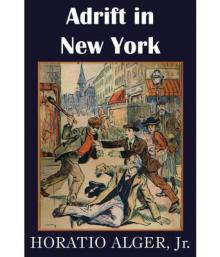 Adrift in New York: Tom and Florence Braving the World
Adrift in New York: Tom and Florence Braving the World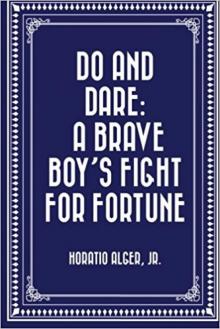 Do and Dare — a Brave Boy's Fight for Fortune
Do and Dare — a Brave Boy's Fight for Fortune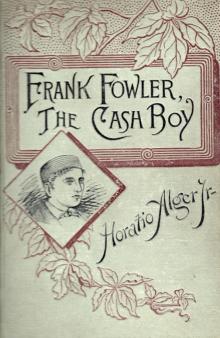 The Cash Boy
The Cash Boy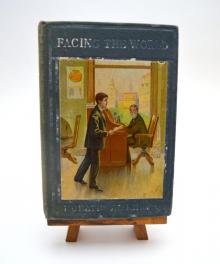 Facing the World
Facing the World The Young Explorer; Or, Claiming His Fortune
The Young Explorer; Or, Claiming His Fortune The Store Boy
The Store Boy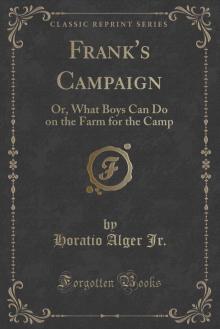 Frank's Campaign; Or, The Farm and the Camp
Frank's Campaign; Or, The Farm and the Camp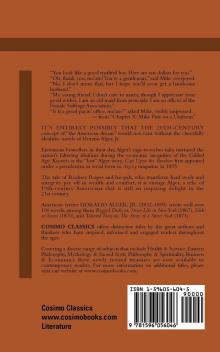 Cast Upon the Breakers
Cast Upon the Breakers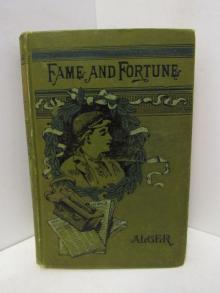 Fame and Fortune; or, The Progress of Richard Hunter
Fame and Fortune; or, The Progress of Richard Hunter The Errand Boy; Or, How Phil Brent Won Success
The Errand Boy; Or, How Phil Brent Won Success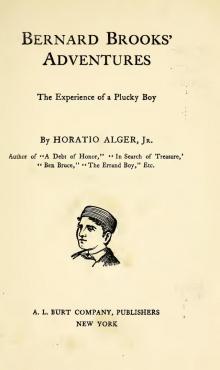 Bernard Brooks' Adventures: The Experience of a Plucky Boy
Bernard Brooks' Adventures: The Experience of a Plucky Boy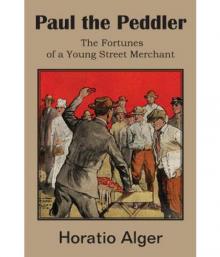 Paul the Peddler; Or, The Fortunes of a Young Street Merchant
Paul the Peddler; Or, The Fortunes of a Young Street Merchant Brave and Bold; Or, The Fortunes of Robert Rushton
Brave and Bold; Or, The Fortunes of Robert Rushton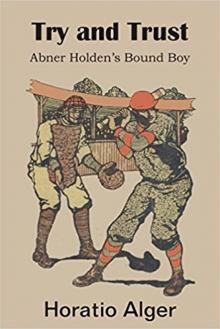 Try and Trust; Or, Abner Holden's Bound Boy
Try and Trust; Or, Abner Holden's Bound Boy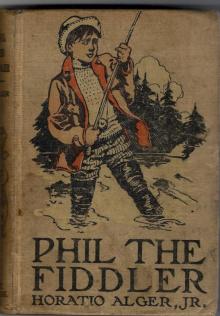 Phil, the Fiddler
Phil, the Fiddler In A New World; or, Among The Gold Fields Of Australia
In A New World; or, Among The Gold Fields Of Australia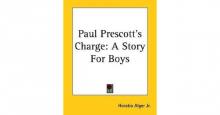 Paul Prescott's Charge
Paul Prescott's Charge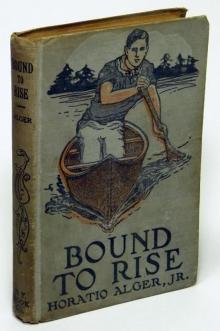 Joe's Luck; Or, Always Wide Awake
Joe's Luck; Or, Always Wide Awake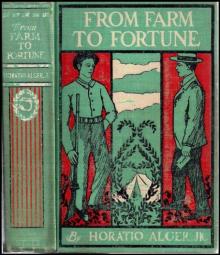 From Farm to Fortune; or, Nat Nason's Strange Experience
From Farm to Fortune; or, Nat Nason's Strange Experience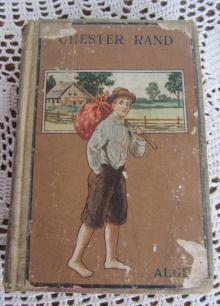 Chester Rand; or, The New Path to Fortune
Chester Rand; or, The New Path to Fortune Driven from Home; Or, Carl Crawford's Experience
Driven from Home; Or, Carl Crawford's Experience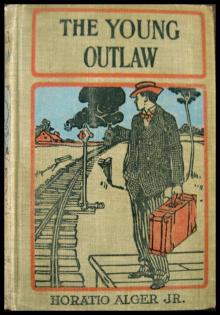 The Young Outlaw; or, Adrift in the Streets
The Young Outlaw; or, Adrift in the Streets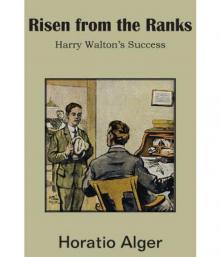 Risen from the Ranks; Or, Harry Walton's Success
Risen from the Ranks; Or, Harry Walton's Success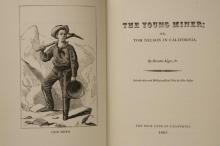 The Young Miner; Or, Tom Nelson in California
The Young Miner; Or, Tom Nelson in California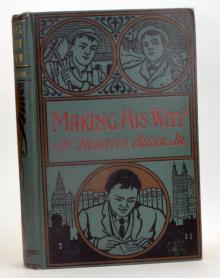 Making His Way; Or, Frank Courtney's Struggle Upward
Making His Way; Or, Frank Courtney's Struggle Upward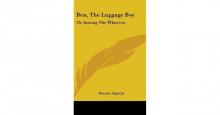 Ben, the Luggage Boy; Or, Among the Wharves
Ben, the Luggage Boy; Or, Among the Wharves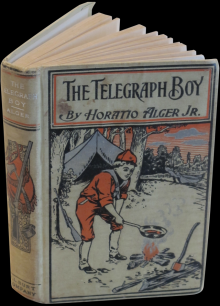 The Telegraph Boy
The Telegraph Boy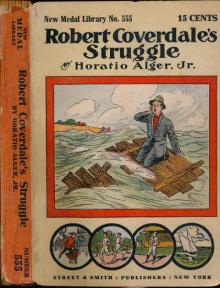 Robert Coverdale's Struggle; Or, on the Wave of Success
Robert Coverdale's Struggle; Or, on the Wave of Success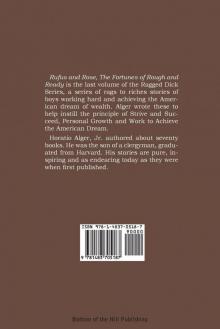 Rufus and Rose; Or, The Fortunes of Rough and Ready
Rufus and Rose; Or, The Fortunes of Rough and Ready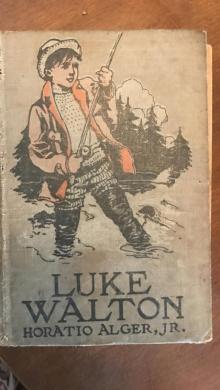 Luke Walton
Luke Walton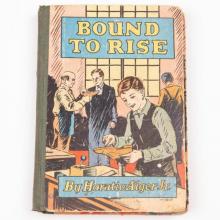 Mark Mason's Victory: The Trials and Triumphs of a Telegraph Boy
Mark Mason's Victory: The Trials and Triumphs of a Telegraph Boy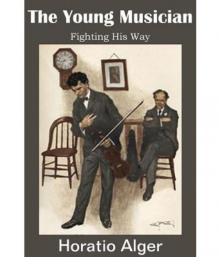 The Young Musician; Or, Fighting His Way
The Young Musician; Or, Fighting His Way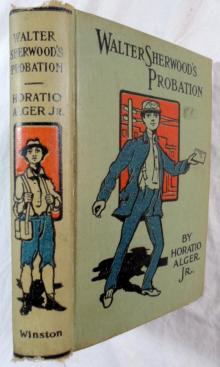 Walter Sherwood's Probation
Walter Sherwood's Probation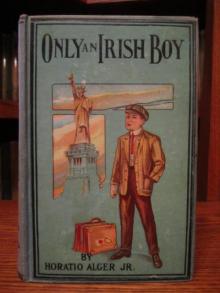 Only an Irish Boy; Or, Andy Burke's Fortunes
Only an Irish Boy; Or, Andy Burke's Fortunes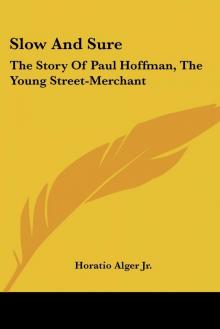 Slow and Sure: The Story of Paul Hoffman the Young Street-Merchant
Slow and Sure: The Story of Paul Hoffman the Young Street-Merchant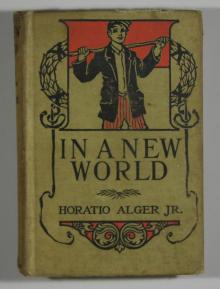 Herbert Carter's Legacy; Or, the Inventor's Son
Herbert Carter's Legacy; Or, the Inventor's Son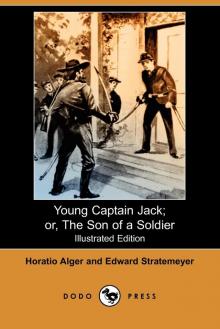 Young Captain Jack; Or, The Son of a Soldier
Young Captain Jack; Or, The Son of a Soldier Timothy Crump's Ward: A Story of American Life
Timothy Crump's Ward: A Story of American Life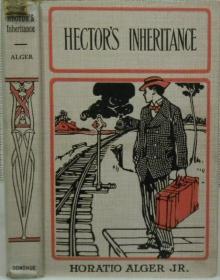 Hector's Inheritance, Or, the Boys of Smith Institute
Hector's Inheritance, Or, the Boys of Smith Institute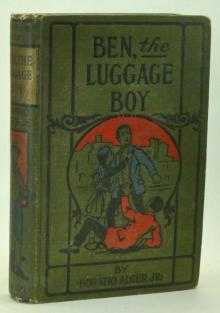 Ben's Nugget; Or, A Boy's Search For Fortune
Ben's Nugget; Or, A Boy's Search For Fortune